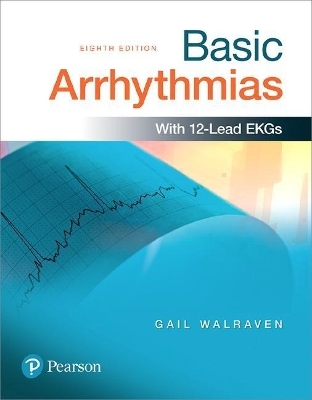
Basic Arrhythmias + MyLab BRADY with Pearson eText
Pearson Education (US)
978-0-13-470107-3 (ISBN)
This package includes MyLab BRADY
Focused coverage and realistic hands-on practice help students master basic arrhythmias
Basic Arrhythmias, Eighth Edition, gives beginning students a strong basic understanding of the common, uncomplicated rhythms that are a foundation for further learning and success in electrocardiography. Concepts are presented in a flexible, progressive approach to allow for self-paced or classroom learning. Chapters cover basic electrophysiology, waves and measurements, rhythm analysis, and the five major groups of arrhythmias. Basic Arrhythmias includes appendices on Clinical Implications, Cardiac Anatomy and Physiology, 12-Lead Electrocardiography, Basic 12-Lead Interpretation, and Pathophysiology of Arrhythmias. Practice with over 680 EKG rhythm strips that are included in most chapters to give students extensive, realistic hands-on practice—the single most important element in developing arrhythmia interpretation skills.
Now available with MyLab BRADY
MyLab™ BRADY is an online homework, tutorial, and assessment program that gives you the power to reach students on their terms–and to teach however you like. Here are just a few of the features you will find in our MyLab BRADY:
Gradebook: A fully functional and customizable gradebook allows instructors to view students results by chapter, outcome, homework and more, to help identify where more classroom time is needed.
Multimedia Library: To help you build assignments, or add an extra engaging element to your lectures, each MyLab BRADY course comes with a Multimedia Library.
Pearson eText: The Pearson eText gives students access to their textbook anytime, anywhere. In addition to note taking, highlighting, and bookmarking, the Pearson eText offers interactive and sharing features
Rhythm Randomizer: The Rhythm Randomizer is an interactive learning tool that systematically walks students through the process of analyzing and interpreting arrhythmias. Students are guided each step of the way to determine Regularity, Rate, PWaves, PRI, QRS and then their interpretation. Instructors can assign predeveloped homework exercises or create their own by selecting specific strips or randomly based on the parameters they set. Student scores automatically feed to the gradebook in addition to detailed metrics including class reports and student reports.
Students, if interested in purchasing this title with MyBRADYLab, ask your instructor for the correct package ISBN and Course ID. Instructors, contact your Pearson representative for more information.
CHAPTER 1
Electrophysiology 1
Self-Instructional Unit Electrical vs. Mechanical Function ¿ Sodium Pump ¿ Polarization, Depolarization ¿ Conduction System ¿ Inherent Rates ¿ Irritability, Escape ¿ Nervous System Influence
¿ KEY POINTS
¿ SELF-TEST
CHAPTER 2
Waves and Measurements 17
Self-Instructional Unit Introduction ¿ Electrodes ¿ Rule of Electrical Flow ¿ Monitoring Leads ¿ Graph Paper ¿ Voltage Measurements ¿ Time Measurements ¿ Cardiac Cycle ¿ Waves, Intervals, Segments ¿ P Wave and PRI ¿ QRS Complex ¿ ST Segment and T Wave ¿ Measurements ¿ Artifact, Interference ¿ Refractory Periods
¿ KEY POINTS
¿ SELF-TEST
¿ PRACTICE STRIPS (PART I)
¿ PRACTICE STRIPS (PART II)
¿ ANSWERS FOR PRACTICE STRIPS (PART I)
¿ ANSWERS FOR PRACTICE STRIPS (PART II)
CHAPTER 3
Analyzing EKG Rhythm Strips
Self-Instructional Unit Analysis Format ¿ Regularity ¿ Rate ¿ P Waves ¿ PR Intervals and QRS Complexes ¿ Role of the AV Node ¿ Ventricular vs. Supraventricular
¿ KEY POINTS
¿ SELF-TEST
¿ PRACTICE STRIPS (PART I)
¿ PRACTICE STRIPS (PART II)
CHAPTER 4
Sinus Rhythms
Self-Instructional Unit
Introduction ¿ Normal Sinus Rhythm ¿ Sinus Bradycardia ¿ Sinus Tachycardia ¿ Sinus Arrhythmia ¿ Review
¿ KEY POINTS
¿ SELF-TEST
¿ PRACTICE STRIPS
¿ INTERPRETATION OF CHAPTER 3 RHYTHM STRIPS
CHAPTER 5
Atrial Rhythms
Self-Instructional Unit Atrial Rhythms 1 ¿ Wandering Pacemaker 1 ¿ Ectopics ¿ Premature Atrial Complex ¿ Atrial Tachycardia ¿ Atrial Flutter ¿ Atrial Fibrillation
¿ KEY POINTS
¿ SELF-TEST
¿ PRACTICE STRIPS
CHAPTER 6
Junctional Rhythms
Self-Instructional Unit Junctional Pacemaker ¿ Junctional P Wave 1 ¿ Premature Junctional Complex ¿ Junctional Escape Rhythm ¿ Junctional Tachycardia ¿ Accelerated Junctional Rhythm ¿ Supraventricular Tachycardia
¿ KEY POINTS
¿ SELF-TEST
¿ PRACTICE STRIPS
CHAPTER 7
Heart Blocks
Self-Instructional Unit Conduction through the AV Node ¿ Heart Blocks ¿ First-Degree Heart Block 2 ¿ Second-Degree Heart Blocks ¿ Type II Second-Degree Heart Block ¿ Wenckebach (Type I Second-Degree Heart Block) ¿ Third-Degree Heart Block (Complete Heart Block)
¿ KEY POINTS
¿ SELF-TEST
¿ PRACTICE STRIPS
CHAPTER 8
Ventricular Rhythms
Self-Instructional Unit
Ventricular Rhythms ¿ Premature Ventricular Complex (PVC) ¿ Unifocal vs. Multifocal ¿ R on T Phenomenon ¿ Runs and Couplets ¿ Grouped Beating 2 ¿ Ventricular Tachycardia (VT) ¿ Ventricular Fibrillation ¿ Idioventricular Rhythm ¿ Asystole
¿ KEY POINTS
¿ SELF-TEST
¿ PRACTICE STRIPS
CHAPTER 9
Practice Makes Perfect
Introduction
¿ PRACTICE STRIPS
CHAPTER 10
Final Challenge
Introduction
¿ SELF-TEST
¿ ANSWERS TO SELF-TEST
APPENDIX A
Cardiac Anatomy and Physiology
APPENDIX B
Pathophysiology and Clinical Implications of Arrhythmias
APPENDIX C
12-Lead Electrocardiography
APPENDIX D
Basic 12-Lead Interpretation
APPENDIX E
Pacemakers
Glossary
Index of Practice Strips by Rhythm Names
Subject Index
Flash Cards
| Erscheint lt. Verlag | 26.12.2016 |
|---|---|
| Verlagsort | Upper Saddle River |
| Sprache | englisch |
| Themenwelt | Medizin / Pharmazie ► Gesundheitswesen |
| ISBN-10 | 0-13-470107-0 / 0134701070 |
| ISBN-13 | 978-0-13-470107-3 / 9780134701073 |
| Zustand | Neuware |
| Haben Sie eine Frage zum Produkt? |